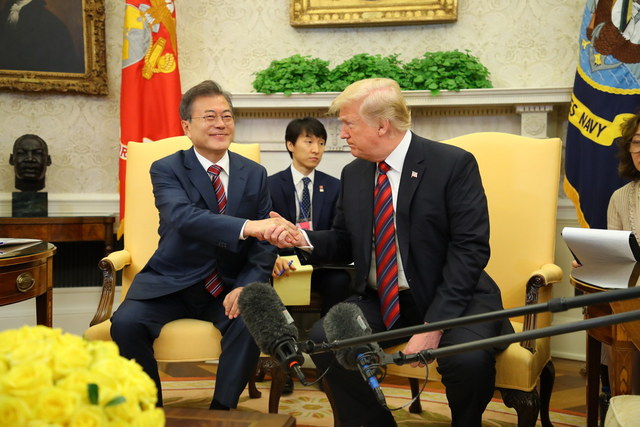 |
|
South Korean President Moon Jae-in shakes hands with US President Donald Trump during the South Korea-US summit at the White House on May 22.
|
South and North Korea share same concept of inspection with US
The US Department of State announced that when the Yongbyon nuclear complex is shut down, the involvement of an inspector from the International Atomic Energy Agency (IAEA) was “assumed by South Korea, North Korea and the United States.” Although the Pyongyang Joint Declaration does not include any specific statements about the inspection of the Yongbyon nuclear facilities, the announcement suggests that North Korea, South Korea and the US have come that much closer to a consensus on the issue. On Sept. 20, US Department of State Spokesperson Heather Nauert said, in answer to questions from journalists asking whether an US and IAEA inspector would be involved in the shutdown of the Yongbyon nuclear complex, “President Moon and also Chairman Kim did talk about inspectors, of course. Having IAEA and US inspectors be a part of anything is really just a shared understanding.” She added, “So that would just be normal course of doing business [when denuclearizing]. We have that shared understanding with the countries [North and South Korea].” She also said, “We have had conversations with that government, with the government of North Korea, and that is our mutual understanding. That is also the understanding between the Republic of Korea and North Korea, and that was one of the things that was discussed, according to my understanding of it, over the past few days.” The inspection of the Yongbyon nuclear complex has become a subject of discussion because of the significant disconnect between the expressions in the Pyongyang Declaration and the statements from US President Donald Trump and Secretary of State Mike Pompeo that followed. According to the Pyongyang Joint Declaration, North Korea “will permanently dismantle the missile engine test site and missile launch pad at Tongchang Village under the observation of experts from the countries concerned. However, regarding the nuclear facilities in Yongbyon, North Korea only “expressed its willingness to continue to take additional measures, such as the permanent shutdown of the nuclear facilities in Yongbyon, depending on corresponding measures from the US.” From these words alone it is unclear whether North Korea has agreed to the inspection of its Yongbyon nuclear facilities as well as its Tongchang Village site. Trump’s Twitter reaction and Moon’s interpretation in post-summit speech However, soon after the Pyongyang Declaration was announced, President Trump took to Twitter to announce that “Kim Jong Un has agreed to allow [n]uclear inspections,” and Secretary of State Pompeo, in a statement on Sept. 20, said that the US welcomed the news that North and South Korea had agreed to “the permanent dismantlement of all facilities at Yongbyon in the presence of US and IAEA inspectors.” In an interview with Fox News on Sept. 19, he said, “We made another step, where we will get verification of an element of North Korea’s program on the ground,” effectively propping up the questions of inspection as an established fact, which could potentially become a sensitive issue between North Korea and the US. In an address to the South Korean people on Sept. 20, following his return to Seoul, President Moon Jae-in announced that, “The terms “observation” and “permanent” dismantlement that the North used in the Pyongyang Declaration of September 2018 have the same meaning as a verifiable and irreversible dismantlement ultimately.” In other words, although the actual phrasing used was “observation,” and “permanent shutdown,” the process or content of such phrasing signifies inspection and verification. On the other hand, in her Sept. 20 briefing, State Department Spokesperson Heather Nauert said, in response to questions about the corresponding measures North Korea requested for the shutdown of the Yongbyon nuclear complex, that “nothing can happen in the absence of denuclearization. Denuclearization has to come first,” emphasizing a stance that prioritized denuclearization. Please direct comments or questions to [english@hani.co.kr]





